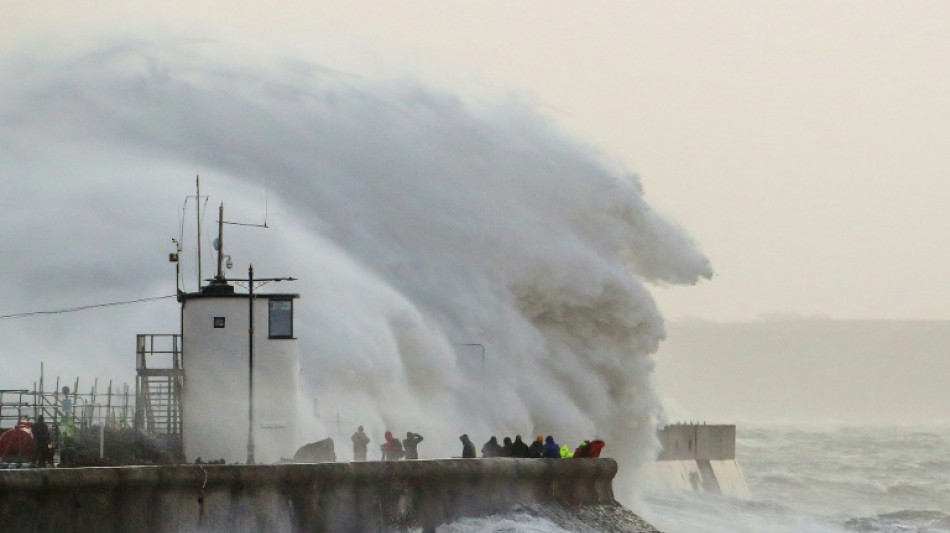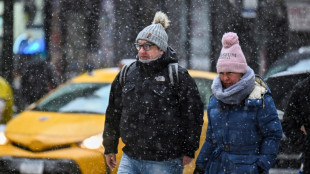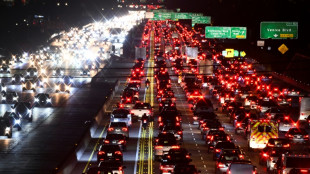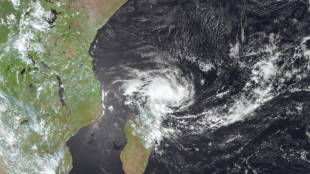
-
 60 killed in Colombia guerilla violence
60 killed in Colombia guerilla violence
-
'Invincible' Gauff revels in Melbourne heat to reach quarters

-
 Indonesia's Mount Ibu erupts more than 1,000 times this month
Indonesia's Mount Ibu erupts more than 1,000 times this month
-
Sumo to stage event in Paris as part of global push

-
 Deadly strikes on Gaza after Israel says ceasefire delayed
Deadly strikes on Gaza after Israel says ceasefire delayed
-
Badosa 'loves Coco' but is gunning for 'revenge' in Melbourne quarters

-
 Sabalenka, Gauff on Melbourne collision course as Alcaraz moves on
Sabalenka, Gauff on Melbourne collision course as Alcaraz moves on
-
Alcaraz into Australian Open quarters after Draper retires

-
 Sabalenka uses fighting spirit to banish Australian Open blues
Sabalenka uses fighting spirit to banish Australian Open blues
-
Sabalenka, Gauff on Melbourne collision course after reaching quarters

-
 Swiss rider Ruegg wins opening UCI World Tour event in Australia
Swiss rider Ruegg wins opening UCI World Tour event in Australia
-
Mitchell scores 36 as Cavs bounce back, Celtics downed

-
 Sabalenka a happy snapper at Australian Open
Sabalenka a happy snapper at Australian Open
-
Gauff turns up heat on Bencic to reach Australian Open quarters

-
 Commanders stun Lions in NFL thriller, Chiefs advance
Commanders stun Lions in NFL thriller, Chiefs advance
-
Protesters storm S. Korea court after president's detention extended

-
 TikTok notifies US users of shutdown as Trump seeks last-ditch solution
TikTok notifies US users of shutdown as Trump seeks last-ditch solution
-
Ceasefire in Israel-Hamas war to begin at 0630 GMT

-
 Wuhan keen to shake off pandemic label five years on
Wuhan keen to shake off pandemic label five years on
-
Sabalenka imperious as Djokovic, Alcaraz on Melbourne collision course

-
 'Generational problem': Youth still struggling in pandemic's shadow
'Generational problem': Youth still struggling in pandemic's shadow
-
Vaccine misinformation: a lasting side effect from Covid

-
 Sabalenka blows away Andreeva to reach Melbourne quarter-finals
Sabalenka blows away Andreeva to reach Melbourne quarter-finals
-
Hope, fear at Paris rally for Gaza hostages

-
 Separated by LA wildfires, a happy reunion for some pets, owners
Separated by LA wildfires, a happy reunion for some pets, owners
-
France's Moutet 'collapsed in shower' before Australian Open match

-
 In US, teleworkers don't want to turn back
In US, teleworkers don't want to turn back
-
Covid's origins reviewed: Lab leak or natural spillover?

-
 Trump arrives in Washington ahead of Monday's inauguration
Trump arrives in Washington ahead of Monday's inauguration
-
Steady Straka takes four-shot lead in PGA Tour's American Express

-
 Kelce, Mahomes double-act leads Chiefs past Texans in NFL playoffs
Kelce, Mahomes double-act leads Chiefs past Texans in NFL playoffs
-
Barcelona's Balde complains of racist abuse in Getafe draw

-
 Frustrated Barca fail to capitalise on Atletico La Liga slip
Frustrated Barca fail to capitalise on Atletico La Liga slip
-
More Kenyan police land in Haiti to bolster security mission

-
 McGlynn leads youthful USA to friendly win over Venezuela
McGlynn leads youthful USA to friendly win over Venezuela
-
Barcelona stumble to frustrating Getafe draw in title setback

-
 Lukaku fires Napoli six points clear at Atalanta, Juve sink Milan
Lukaku fires Napoli six points clear at Atalanta, Juve sink Milan
-
Milder winds help LA firefighters as Trump vows to visit

-
 S. Korean court extends impeached president's detention, angering supporters
S. Korean court extends impeached president's detention, angering supporters
-
Wirtz has Leverkusen on Bayern's heels to keep repeat title 'dream' alive

-
 Arsenal must take blame for Villa fightback: Arteta
Arsenal must take blame for Villa fightback: Arteta
-
Nunez late show extends Liverpool's lead, Arsenal held by Aston Villa

-
 Russian attacks kill six across Ukraine, Kyiv says
Russian attacks kill six across Ukraine, Kyiv says
-
Northampton, Leinster claim Champions Cup pool top spots

-
 Arsenal's title bid rocked by Villa fightback
Arsenal's title bid rocked by Villa fightback
-
Superb Wirtz keeps Leverkusen on pace with leaders Bayern

-
 Detention extended for S. Korea's impeached president
Detention extended for S. Korea's impeached president
-
Thousands attend funeral of Liberian ex-warlord Prince Johnson

-
 Barcola strikes as PSG fight back to beat Lens
Barcola strikes as PSG fight back to beat Lens
-
Juventus into Serie A Champions League spots with victory over AC Milan


Millions take shelter in UK as Storm Eunice threatens Europe
Millions hunkered down as Storm Eunice pummelled southern Britain with fearsome winds and crashing waves on Friday, leaving the streets of London virtually deserted and triggering broader warnings in Europe.
The UK capital was placed under its first ever "red" weather warning, meaning there is "danger to life", and the same level of alert was in place across southern England and South Wales, where schools were closed and public transport paralysed.
Eunice knocked out power in 55,000 homes and businesses in Ireland and hundreds of homes in Cornwall, southwest England, which was hit by gusts of 90 miles (145 kilometres) per hour and waves that breached sea walls along the coast.
It accrued power in a "sting jet", a rarely seen meteorological phenomenon that brought havoc to Britain in the "Great Storm" of 1987, and sparked a red alert also in the Netherlands.
Huge waves battered the Brittany coast in northwest France. Long-distance and regional trains were being gradually halted in northern Germany, while warnings were also in place in Belgium.
Ferries across the Channel, the world's busiest shipping lane, were cancelled, as were flights from northern Europe's aviation hubs, including around 300 from Schiphol in Amsterdam.
Prime Minister Boris Johnson, who has placed the British army on standby, tweeted: "We should all follow the advice and take precautions to keep safe."
The Met Office, Britain's meteorological service, issued its first red weather warning for London -- active until 1500 GMT -- since the alert system was introduced in 2011.
"The whole of the country will be affected by the extremely strong and damaging winds, which will cause significant disruption," Met Office forecaster Annie Shuttleworth said.
The agency warned that roofs could be blown off, trees uprooted and power lines brought down.
Roads, bridges and railway lines have already been hit causing delays and cancellations to bus, train and ferry services in southern Britain. Heavy snow was also forecast in Scotland and northern England.
- Climate impact? -
Environment Agency official Roy Stokes warned weather watchers and amateur photographers against heading to Britain's southern coastline in search of dramatic footage, calling it "probably the most stupid thing you can do".
London's rush-hour streets, where activity has been slowly returning to pre-pandemic levels, were eerily calm as many heeded the advice to stay home as the storm approached.
Trains into the capital were already running limited services during the morning commute, with speed limits in place.
All buses and trains in Wales were cancelled, while the National Highways agency issued a severe weather alert for strong winds covering the whole of Britain's strategic road network until 1800 GMT.
Key river crossings, including the Severn Bridge linking Wales to southwest England and the QEII Bridge south of London, were also closed.
The arriving storm forced Prince Charles, the heir to the throne, to postpone a trip to South Wales on Friday "in the interests of public safety", his office said.
Another storm, Dudley, caused transport disruption and power outages when it hit Britain on Wednesday, although damage was not widespread.
Experts said the frequency and intensity of the storms could not be linked necessarily to climate change, but that storms were causing more damage as a result.
"Yet with more intense rainfall and higher sea levels as human-caused climate change continues to heat the planet, flooding from coastal storm surges and prolonged deluges will worsen still further when these rare, explosive storms hit us in a warmer world."
B.Torres--AT




